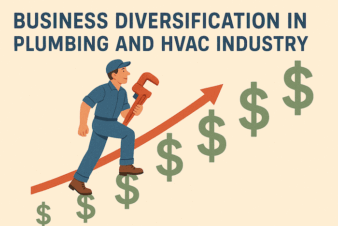There’s barely an area of the economy that COVID hasn’t reached, and that includes the plumbing industry. Of course, there are areas of business that have actually thrived during the pandemic due to the nature of their business.
The initial shut down of some areas caused smaller plumbing companies to shutter, especially those that made the majority of their income through renovations. But once the initial shock of the pandemic was was over, there has been a rebound in business that has been very specific to this sector.
Here’s how COVID has affected the plumbing industry for better and for worse.
The initial reduction of non-essential work
Throughout the pandemic, people don’t want non-essential people in their homes, potentially spreading the virus. Therefore a lot of bathroom and kitchen renovations have been put on hold.
Of course, emergency visits still continued, with replacements of Grundfos pressure pumps, leaks, and blockages still needing to be tackled. In some areas, the number of emergency visits increased as people stayed at home more. People aren’t going to school or work and are staying together indoors for days at a time, putting immense pressure on plumbing systems.
Businesses were also delaying essential maintenance on their systems due to temporary closure or trying to save money. This is undoubtedly going to lead to much larger issues further down the line as old systems develop big problems.
However, due to many people fearing lack of job security or a reduction in income, house sales have suffered, with people instead deciding to stay put and improve their existing properties by adding toilets or bathrooms.
The risk to workers
As an essential service, plumbers have continued to work throughout the pandemic, giving them greater potential exposure to the virus. In particular, men who are older, or with pre-existing health conditions suffered from the virus more severely than a lot of other groups.
Abandoned buildings need increased attention
Many buildings that are usually occupied have needed additional attention. The lack of use can lead to the failure of seals in the plumbing system which must be replaced to prevent substantial damage to the building.
Customer communication has changed
Large parts of the plumbing industry have been known to be a little behind when it comes to using the latest technology to communicate with customers. To the industry’s credit, it has adapted very quickly, adopting systems like live chat and video calls to conduct initial consultations with clients, thereby reducing the need for unnecessary contact. Beyond the pandemic, these new methods of communication are likely to stick around in some form as customers expect this type of service.
Conclusion
The plumbing industry has not been beyond the reach of the effects of the pandemic and as a number of other trades, has had to adapt to very specific situations brought about by a sudden change in living and working patterns of the country. It’s yet to be seen how some areas will rebound after the restrictions are lifted in many states.




Join the conversation: